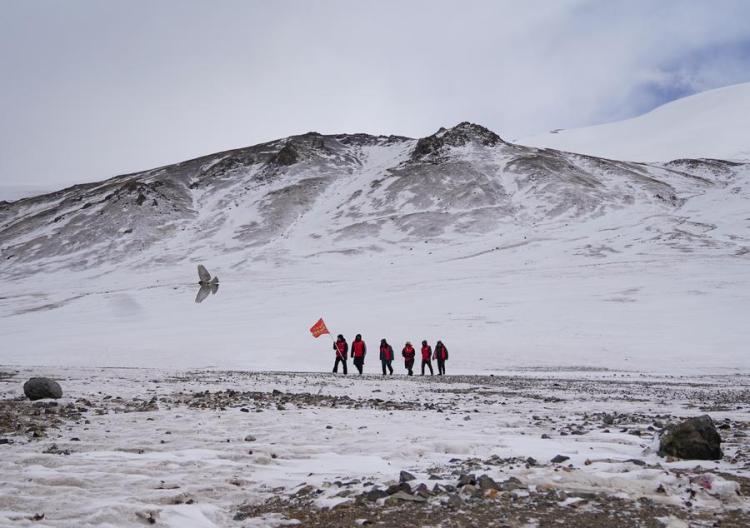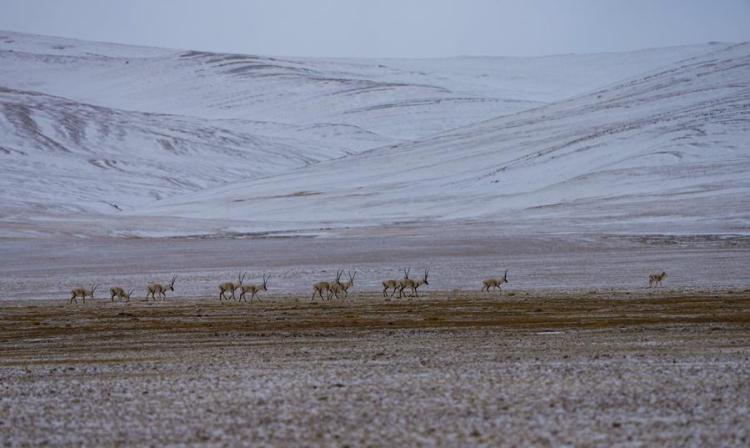Source:Xinhua 2024-03-23
* Friday marks World Water Day.
* While the Chinese government has emphasized ecological protection, herders at the source of the Yangtze River have made their contributions.
* The waterways, wetlands and glaciers in the area have been effectively protected.
LHASA, March 22 (Xinhua) -- Although it is mid-spring in most parts of China, Namdrak rode his motorcycle deep into the glacier as snow and strong winds swept across the prairie.
Namdrak, 48, hails from a village in Maqu Township in the city of Nagqu, Xizang Autonomous Region in southwest China. The water melt from the glacier near his home forms Tuotuohe, the source of China's mother river Yangtze River.
Apart from herding, the Tibetan has another job -- a member of the volunteer guardian team, which patrols the source of the Yangtze River.
"The fragile ecology cannot afford to be polluted. So it's extremely vital that we protect it," Namdrak said.

Friday marks World Water Day. While the Chinese government has emphasized the concept of "lucid waters and lush mountains are invaluable assets," herders at the source of the Yangtze River have made their own contributions to environmental protection.
Despite being a township, Maqu is roughly the size of four Shanghai cities. In the area with an average altitude of more than 4,800 meters, the team members have to combat wind and snow in winter and boggy marsh in summer.
Dawa Dondrup, a member of the team, said they patrol five to six times every month, with each trip stretching some 40 km. They clear riverside garbage, prevent any acts that may lead to pollution and persuade intruders to leave the nature reserve.
Once, tourists driving four cross-country vehicles lost their way while heading to the glacier under the moonlight and got stuck on the pasture, damaging a vast area of grass.
The township government then organized rescue efforts to pull them out and persuaded them to leave, recalled Tsewang Drolma, Party chief of the township.

As most of the patrol area has no mobile signal, the volunteers use walkie-talkies to stay in touch with one another.
"The simple and practical communication way connects herders scattered across the pastoral area, forming a 'protective net' for the ecology at the source of Yangtze River," she said, adding that each patroller is granted a subsidy of 12,000 yuan (about 1,690 U.S. dollars) a year.
According to a white paper issued last year, from 2016 to 2022, 537,700 eco-environmental conservation jobs were created on average in Xizang each year, and a total of 12.64 billion yuan was paid in eco-environmental compensation.
Tenpa, mayor of Nagqu, said the city has prioritized ecological conservation, designating river and lake chiefs at various levels for the protection of the sources of rivers.
"The waterways, wetlands and glaciers in the area as well as their biodiversity have been effectively protected in recent years," Tenpa said.

Rinchen Gyatso, head of the patrolling team, said it is rewarding to see the sound environment being safeguarded at their home.
"The appearance of abundant Tibetan antelopes, Tibetan wild donkeys and other wild animals is the biggest recognition for our work," he said.
(Video reporters: Loden and Purbu Tsering; Video editors: Zhang Yucheng, Hui Peipei and Zheng Xin)
Copyright © Xizang Daily & China Xizang News All rights reserved
Reproduction in whole or in part without permissions prohibited
Index Code: 藏 ICP 备 05000021 号
Producer: Xizang Daily International Communication Center